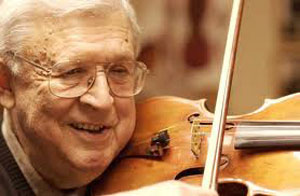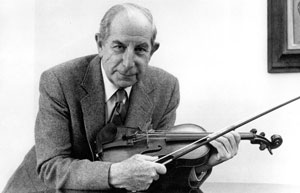NEC remembers Zeitlin, Totenberg
The two great violinists and teachers passed away this week.
NEC Mourns Death of Two Violin Greats, Zvi Zeitlin and Roman Totenberg
New England Conservatory joins the music world in mourning the deaths of two legendary violin virtuosos and teachers, Zvi Zeitlin and Roman Totenberg. Zeitlin, 90, who taught at the Eastman School of Music for 45 years, died May 2. Totenberg, 101, who taught for half a century at Boston University and also was director of the Longy School from 1978—1985, died on Wednesday. Both had been musically active until the time of their deaths: Zeitlin gave a 90th birthday recital at Eastman in February. Totenberg was still “teaching” on his death bed, listening to former students who came to visit him, and correcting their intonation.
 One of the most important violinists of the 20th century, Zeitlin (in photo right) was born in what is now Belarus, and grew up in Palestine. He was the youngest scholarship student at Juilliard (at age 11), earned a degree in Judaic Studies at Hebrew University, and made his professional New York debut in 1951. As a soloist, he performed with most of the major orchestras of the world, including the Boston Symphony. He also performed regularly in chamber music ensembles including the Eastman Trio, which he founded with pianist Barry Snyder and cellist Robert Sylvester.
One of the most important violinists of the 20th century, Zeitlin (in photo right) was born in what is now Belarus, and grew up in Palestine. He was the youngest scholarship student at Juilliard (at age 11), earned a degree in Judaic Studies at Hebrew University, and made his professional New York debut in 1951. As a soloist, he performed with most of the major orchestras of the world, including the Boston Symphony. He also performed regularly in chamber music ensembles including the Eastman Trio, which he founded with pianist Barry Snyder and cellist Robert Sylvester.
Zeitlin was renowned as a champion of contemporary music, including the Schoenberg Violin Concerto, his recording of which (with Rafael Kubelik and the Bavarian Radio Orchestra on Deutsche Grammophon) is still prized by connoisseurs. NEC President Tony Woodcock has fond memories of hearing a live performance of the Schoenberg with the BBC Symphony in the early 70s. “He played it with total passion and commitment.”
In an interesting example of conservatory collegiality, the Eastman School commissioned Gunther Schuller’s First Violin Concerto for Zeitlin on the occasion of his assuming the Kilbourn Professor’s Chair in 1976. Schuller, at the time, was President of NEC and recalled the piece, the musician, and the occasion with great zest. “There was a strong NEC connection, particularly in the third movement of the piece, which is full of many significant jazz riffs. I had just recently completed an NEC recording of Paul Whiteman’s orchestra music from 1928-29.” And some of that musical atmosphere made its way into the concerto. One NEC student from the time joked that Schuller “‘was going to teach those violinists (not just the soloist but the orchestral violinists) how to play jazz.’” Zeitlin, according to Schuller, was “very interested in new music and devoted to the piece. He had no problem with the atonality. He was eager for it—unlike some violinists who would say ‘the hell with that I’m going back to Mozart.’ He worked very hard on it and said to me, ‘You know, this is damned difficult but you wrote it so violinistically.’ He played it with great success for probably five years.”
 Roman Totenberg, like Zeitlin, was an émigré. Born in Poland, he spent much of his childhood in Moscow and later in Berlin, where he studied with Carl Flesch, the great violin pedagogue and teacher of Ida Haendel, Josef Hassid and Henryk Szeryng. He made his American debut in 1935 with the National Symphony Orchestra in Washington. He played for several Presidents, performed as a soloist with major orchestras in the United States and Europe, and made many recordings. He also collaborated on various occasions with Stravinsky, Copland, Leopold Stokowski, Arthur Rubinstein and Yehudi Menuhin. At Menuhin’s home in Alma, Calif., in the 1940s, he formed the Alma Trio with the pianist Adolph Baller and the cellist Gabor Rejto.
Roman Totenberg, like Zeitlin, was an émigré. Born in Poland, he spent much of his childhood in Moscow and later in Berlin, where he studied with Carl Flesch, the great violin pedagogue and teacher of Ida Haendel, Josef Hassid and Henryk Szeryng. He made his American debut in 1935 with the National Symphony Orchestra in Washington. He played for several Presidents, performed as a soloist with major orchestras in the United States and Europe, and made many recordings. He also collaborated on various occasions with Stravinsky, Copland, Leopold Stokowski, Arthur Rubinstein and Yehudi Menuhin. At Menuhin’s home in Alma, Calif., in the 1940s, he formed the Alma Trio with the pianist Adolph Baller and the cellist Gabor Rejto.
Teaching was a lifetime avocation for him, beginning in his childhood and continuing through his last days. Lucy Chapman, Chair of Strings at NEC, was a colleague of his at Boston University and at Kneisel Hall, the summer chamber music festival and school in Blue Hill, Maine. She recalled him as a master of technique who also instilled a great love for playing in his students.
“I asked him once: how do you teach changing the bow smoothly from an upbow to a down bow? ‘Come, I show you,’ he said. ‘Play an upbow.’ I did and at exactly the right moment, he made the softest touch on my elbow, tipping the bow imperceptibly to a down bow.”
Chapman also remembered how she quickly came to recognize the Totenberg students when they would perform in the juries (performance final exams) each semester. “I could pick them out even before they took their instruments out of their cases. It didn’t matter how advanced they were. They looked as if they were happier to be playing the violin than anything else in their lives. They just loved it.”
ABOUT NEW ENGLAND CONSERVATORY
Recognized nationally and internationally as a leader among music schools, New England Conservatory in Boston, MA offers rigorous training in an intimate, nurturing community to 720 undergraduate, graduate, and doctoral music students from around the world. Its faculty of 225 boasts internationally esteemed artist-teachers and scholars. Its alumni go on to fill orchestra chairs, concert hall stages, jazz clubs, recording studios, and arts management positions worldwide. Nearly half of the Boston Symphony Orchestra is composed of NEC trained musicians and faculty.
The oldest independent school of music in the United States, NEC was founded in 1867 by Eben Tourjee. Its curriculum is remarkable for its wide range of styles and traditions. On the college level, it features training in classical, jazz, contemporary improvisation, world and early music. Through its Preparatory School, School of Continuing Education, and Community Programs and Partnerships Program, it provides training and performance opportunities for children, pre-college students, adults, and seniors. Through its outreach projects, it allows young musicians to engage with non-traditional audiences in schools, hospitals, and nursing homes—thereby bringing pleasure to new listeners and enlarging the universe for classical music, jazz, and contemporary improvisation.
NEC presents more than 900 free concerts each year, many of them in Jordan Hall, its world- renowned, century-old, beautifully restored concert hall. These programs range from solo recitals to chamber music to orchestral programs to jazz, contemporary improvisation, and opera scenes. Every year, NEC’s opera studies department also presents two fully staged opera productions at the Cutler Majestic Theatre or Paramount Theatre in Boston.
NEC is co-founder and educational partner of From the Top, a weekly radio program that celebrates outstanding young classical musicians from the entire country. With its broadcast home in Jordan Hall, the show is now carried by National Public Radio and is heard on 250 stations throughout the United States.
Contact: Ellen Pfeifer
Public Relations Manager
New England Conservatory
290 Huntington Ave.
Boston, MA 02115
617-585-1143
Ellen.pfeifer@necmusic.edu
